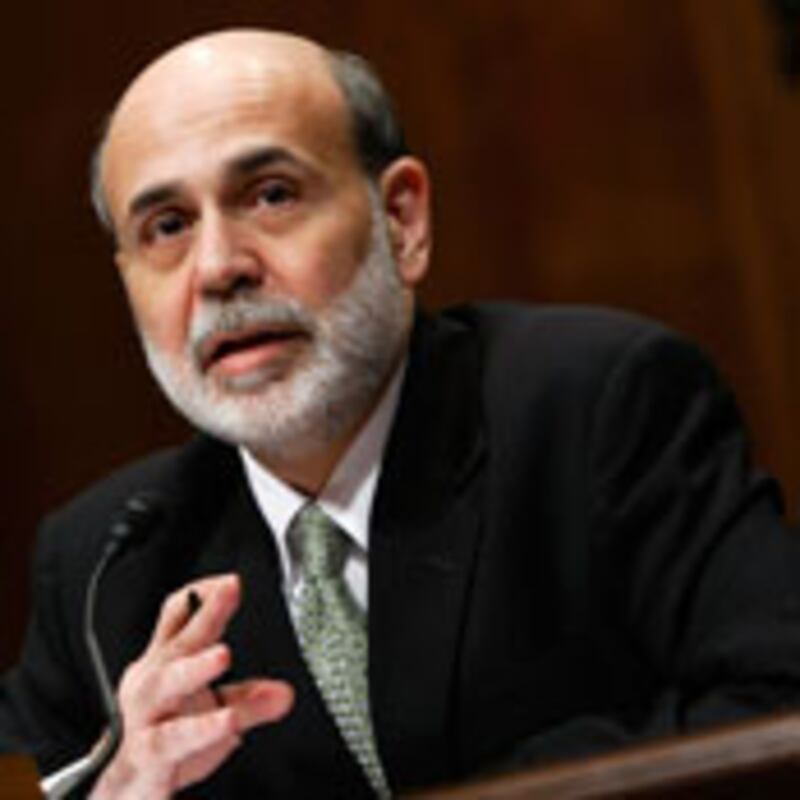
The rumors started early. Ridiculously early, well before President Obama’s inauguration. Larry Summers, Obama’s chief economic adviser, was the leading candidate to replace Federal Reserve Chairman Ben Bernanke when his term ends this coming January. It said so in The Wall Street Journal on November 24. U.S. News and World Report followed a month later with something more affirmative: Summers wasn’t just a candidate, said their source, he was going to get the job. Speculation continued in The Washington Post and New York Daily News, and has picked up recently as Bernanke’s term winds down.
“Bernanke is in good standing with the president. Those who are trying to stir the pot are going to find that they were wrong.”
So what is really going on?
One senior White House official—someone with a higher ranking than a “source” or an “insider”—says this: “Bernanke is in good standing with the president. Those who are trying to stir the pot are going to find that they were wrong.”
Of course, that does not preclude Summers himself—or someone close to him—from stirring the pot, or someone else advancing their ambitions by engaging in speculation about the Fed job. It just makes such pot-stirring unlikely to succeed. Bernanke seems a safe bet to stay.
Other White House officials—with lower rankings, but still several thousand feet above an insider quoting rumors in the financial world—readily concede that Summers can be prickly and competitive with those around him inside the White House and the federal government.
But those same officials say that Summers is making a superhuman effort to soften his infamous prickle and tone down the everyday debates about arcane financial regulations. By all accounts, his personal skills—while still lacking compared to, say, his boss in the Oval Office—are far superior to what they were when he ran Treasury in the Clinton era.
What hasn’t changed is Summers’ desire to win an argument or place his formidable intellect on full display. But in that sense, he is just one member of a mini team of rivals: including his former protégé Tim Geithner at Treasury, Sheila Bair at the FDIC, Christina Romer in the White House Council of Economic Advisers, and one Ben Bernanke. Some of those relationships sound like old married couples; some are more like old divorced couples.
Early speculation centered around the notion that President Obama wanted to reward Summers with the Fed job. That’s not quite how it works. Obama has studied long and hard to get ahead of the disastrous economy and keep up with his economics brain trust, especially the brain of Lawrence Henry Summers.
But Summers’ reward is his central position inside a centralized administration. He is a highly prized member of the White House inner circle, and his speech last week at the Peterson Institute in Washington underscored his value. Summers argued forcefully against the doubters, critics, and opponents who suggest that the administration’s economic efforts have cost a budget-busting fortune and delivered no meaningful results.
To demonstrate how far they have traveled in the last six months, Summers started by quoting Obama’s arch critic Paul Krugman, who predicted “a second Great Depression” in January. Then he sketched out just how bad the economy was at the end of 2008 and start of 2009: the worst three months of job losses since 1945, the worst six-month decline in GDP since 1958, and market predictions of the Dow below 5000.
“Fear was widespread and confidence was scarce,” he explained. “Traditional measures of consumer and business confidence fell to low levels not seen in decades. The anxiety stretched well into the mainstream.” Summers spelled out a comprehensive political and economic defense of the stimulus and the administration’s broader policy agenda.
You don’t get to make such speeches in the Obama White House unless you’re in a strong position, with a personal ability to reach across agencies, departments, and other White House offices, to shape policy across the board.
Bernanke’s term does not expire until January. A lot can happen in politics before then to change the dynamic, especially if the economy worsens rather than improves. But so far, there seems little desire inside the White House to start playing shuffleboard with the people trying to steer the economy away from the rocks.
Richard Wolffe is a Daily Beast columnist and an award-winning journalist, political analyst for MSNBC, and senior strategist at Public Strategies. He covered the entire length of Barack Obama's presidential campaign for Newsweek magazine. His book, Renegade: The Making of a President , will be published by Crown in June.





